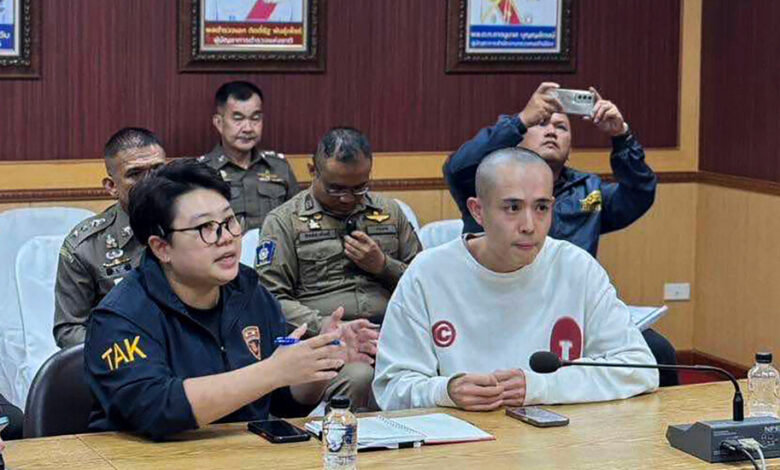Chinese celebrities and tourists think twice about Thailand

Charter flights have been cancelled. The show has been canceled or postponed. Travel companies have received requests from travelers wanting to change their plans.
Chinese tourists have canceled trips to Thailand out of fear over a story about a Chinese actor being kidnapped there, taken to Myanmar and forced to work in an online scam. The incident is a blow to Thailand’s tourism industry ahead of the peak Lunar New Year holiday later this month, when many Chinese are expected to visit.
The disappearance of actor Wang Xing from the Thai border city of Mae Sot this month has raised public concerns about safety in Thailand. Mr. Wang was later rescued from a fraud ring in Myanmar, but many tourists and event organizers were very worried.
Eason Chan, a Hong Kong pop star, has canceled a sold-out concert scheduled to take place next month at Bangkok’s Impact Arena, citing “safety concerns for with Chinese citizens and fans around the world when coming to Thailand.” Zhao Benshan, a Chinese comedian best known for his short plays at Chinese state television’s Lunar New Year gala, also postponed his appearance in Bangkok next month.
Nuntaporn Komonsittivate, chief executive of low-cost airline Thai Lion Air, said on Wednesday that 20% of the airline’s charter flights between China and Thailand – serving routes to Chinese cities Countries outside the 6 cities where the airline usually operates – have been cancelled.
On Weibo, a Chinese social network, people discussed travel refunds and whether Thailand is safe using hashtags that are increasingly popular on the platform. Travel agents in China said they have received requests from tourists to cancel trips to Thailand or change destinations.
Zhang Zhihong, a sales representative for Baochunguo Travel, a company based in the southern city of Shenzhen that specializes in travel to Southeast Asia, said a quarter of the Thailand trips his company handles was canceled last week. “It’s all due to public opinion surrounding this incident. People felt it was unsafe to travel to Thailand and asked for a refund.”
This worry could further complicate Thailand’s efforts to restore tourism after the pandemic. Thailand has relaxed visa requirements for Chinese visitors and offered discounts through Chinese travel platforms in a campaign it calls “Nihao Month,” using the Chinese term Mandarin for “hello”. Nearly 7 million Chinese arrived in Thailand by 2024, making them the largest group of international visitors.
The public outcry over Mr. Wang’s kidnapping has increased pressure on the Thai and Chinese governments to do more to prevent Chinese nationals from being kidnapped and trafficked into fraud rackets in the Philippines. Myanmar.
“Canceling the shows and drawing public attention could force the Thai authorities to get more serious in their actions,” said Ja Ian Chong, an associate professor of political science at the National University of Singapore. combating human trafficking and fraud”.
hundreds of thousands people, often lured by high-paying job offers, were trapped by such cyber criminal activities in Myanmar and Cambodia and forced to work in sophisticated scams to defraud people online. Many of the prisoners first arrived in Thailand before being smuggled across the porous border into lawless areas mostly controlled by Chinese organized crime syndicates.
Thai police said Mr. Wang went to Bangkok for what he believed was a casting opportunity. After he went missing on January 3, his girlfriend reported it to the police and the Chinese embassy in Thailand. She appealed for help on social media and her posts shared by Chinese celebrities went viral.
On January 7, Thai authorities said Mr. Wang had been found and rescued but did not provide details. Criminal gangs often demand huge ransoms to free detainees from such compounds.
Mr. Wang, in a video interview with Thai media after his release, said he was forced to shave his head and learn how to type quickly.
Thai officials sought to use his rescue to reassure Chinese tourists about visiting Thailand. In one video, a Thai police officer urged Mr. Wang: “You think Thailand is safe for you. Can you speak in Chinese?”
Mr. Wang’s quick rescue created a wave of calls for help from the families of other Chinese victims, some of whom had been missing in Southeast Asia for months or years. A diary containing detailed information about the disappearance of more than 170 other Chinese victims was widely shared on the social network Weibo.
Thai officials have gone out of their way to show that they are working to protect the safety of tourists. Thai police met Chinese diplomats to discuss establishing a center Coordinate efforts to search for missing persons and exchange information. And on Monday, Thai authorities said two Chinese women kidnapped in Thailand had been rescued and repatriated by Chinese authorities.
Thienprasit Chaiyapatranun, president of the Thai Hotels Association, said he hoped the Thai government would do more to allay the concerns of Chinese tourists.
“We are worried that it will have a long-term impact,” he said.
Tu Di Trieu contributing research.




